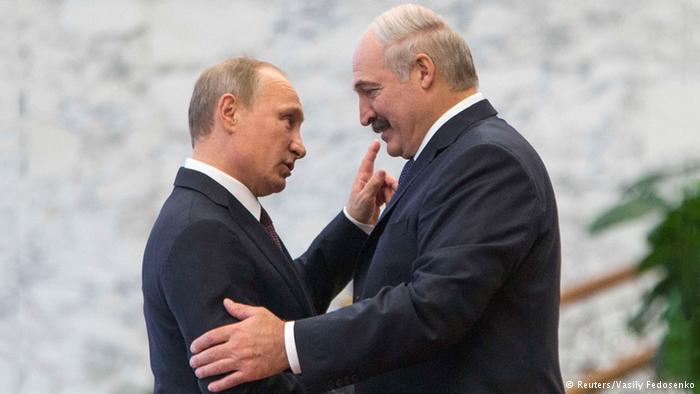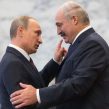
In Foreign Affairs and Politics, Belarus Enters Uncharted Waters
Publication: Eurasia Daily Monitor Volume: 12 Issue: 171
By:

On September 19, following his one-on-one meeting in Sochi with Belarusian President Alyaksandr Lukashenka, Russia’s President Vladimir Putin issued an order to launch negotiations with Belarus about the creation of a new Russian airbase near Bobruisk (Tut.by, September 19). Vigorous discussion in Belarus, this past week, about the implications of this development has tended to invoke and revolve around a recent report entitled “The New Geostrategy of Russia: Consequences and Challenges for International Security” (Csfps.by, September 14). Published by the Minsk-based Center for Strategic and Foreign Policy Studies (CSFPS), this report contains, inter alia, a possible scenario of “military-political destabilization of the Republic of Belarus within the nearest three to six months” via an intervention by Russian Armed Forces on Belarusian territory. The immediate pretext for bringing Russian troops to Belarus may be “Minsk’s decision to reject a Russian airbase on [Belarusian] land and thereby undermine the peace process in Ukraine.”
Not everybody sees this above-cited overt military intervention scenario as realistic. Denis Melyantsov, from the Belarusian Institute for Strategic Studies, believes that Russia does not have to send in military forces to coerce Lukashenka, because it possesses enough influence on Belarus to push through its decisions by softer means. But, he notes, Minsk is nonetheless likely to put on hold any airbase-related agreement. To undermine Belarus’s rapprochement with the West, it would be enough for Russia to instigate a small protest action in which participants smash some windows in downtown Minsk, thus provoking a harsh reaction by the Lukashenka government. Andrei Fedorov, yet another opposition-minded analyst, also believes that a near-term Russian military occupation of Belarus is unlikely, as Russia is bogged down on other fronts and, for example, badly wants to “swap Syria for Crimea.” According to Alexander Klaskovsky of BelaPan, Belarus’s non-state press agency, the CSFPS report is meant to primarily send a message to the European Union and the United States: Unless the West supports Lukashenka, it will be forced to deal with Putin in Belarus (Naviny.by, September 16).
The CSFPS report’s authors—CSFPS director, Arseny Sivitsky, as well as Yury Tsarik, who used to work for the presidential administration—have never been associated with the opposition. Moreover, Sivitsky has been a freelance columnist for Izvestia, Russia’s pro-Kremlin tabloid; and Tsarik, for example, authored a text lavishly praising Putin’s October 2014 Valdai Forum speech, in which the president lambasted Washington for aspiring to lead a unipolar world (Bgr.by, November 12, 2014). Therefore, their report’s negative commentary on Moscow’s foreign policy is particularly striking. It contains the most unflattering and stern portrayal of Russia’s foreign policy that has ever emanated from a government-friendly entity of Belarus. The emphasis of the document is on Russia’s almost maniacal preoccupation with destabilizing its “near abroad” as a way of squeezing out unwanted geopolitical rivals from Russia’s sphere of influence. The implied destabilization efforts are crafty rather than straightforward. For example, Moscow is accused of funding the most consistently anti-Russian nationalist groups inside Ukraine, such as the Party of Freedom (Svoboda) and the Right Sector (p. 9). Sivitsky and Tsarik’s report also accuses Russia of an attempt to foment a coup d’état in 2010 in Belarus (p. 9), even though Minsk had previously blamed German and Polish intelligence services for such an attempt. Finally, Moscow is charged with feigning its vocal condemnation of the Islamic State, and of “undermining the institutional unity of NATO [the North Atlantic Treaty Organization] and the European Union” (Csfps.by, September 14).
The authors’ recommendations are even more explosive, considering the source of the entire document. For example, they write: “the support of Ukraine by the USA and EU should be continued.” The main goal of that support is the “consolidation of central power in Kyiv” as well as “cleansing the power structures from […] the representatives of the old nomenklatura connected to Russia” (p. 17). Perhaps the most controversial aspect of the document is its authors’ claim that the “most important allies and possibly the mentors of Russia’s new geostrategy are the neoconservative elites of the USA” (p. 15). The common goals of such unusual bedfellows are, supposedly, overlapping worries about China and Iran as well as about the potential strengthening of the EU, Sivitsky and Tsarik argue.
Against the background of this debate on the Belarusian-Russian military and diplomatic relationship, Belarus’s presidential election campaign is moving ahead. Already two presidential hopefuls made their first 30-minute TV appearances. Tatyana Korotkevich focused on the economic crisis and the necessity to listen to people who are not respected by the state. In the beginning of her speech, she said three words in Belarusian and then switched entirely to Russian. She asserted that Lukashenka has grown tired of leadership and should take a rest; the people will thank him for everything good that has been accomplished under his leadership and move on under the new president. She suggested that businessmen should be supported, that foreign military units should not be stationed in Belarus, and that the country should return to constitutional limits of just two terms in office for the head of state (Tut.by, September 17). Some well-meaning critics, like Yury Zisser, the owner of Tut.by, the country’s most visited non-state-run news portal, opined (via his Facebook account) that Korotkevich is devoid of charisma and that her entire speech was more suited to being read than heard.
Yury Drakakhrust of Radio Liberty called the phenomenon of Korotkevich the “cherry orchard” of Belarusian politics. In the eponymous play by Anton Chekhov, that orchard is a symbol of old values shared by Russian nobles, whereas the cynical and pragmatic businessmen (embodied by the character Ermolai Lopakhin) cut it down to make room for more profitable pursuits. Likewise, for Korotkevich and her campaign manager, politics is not so much about ideas, rather it is business. Thus, when the opposition party Belarusian Popular Front (BPF) denied its support to Korotkevich, her campaign allegedly heaved a sigh of relief. Drakakhrust characterized the Korotkevich campaign’s reaction as: At least we will not have to explain to the public that “we” are not “them” (i.e., BPF-related). BPF is the oldest and the most idea-driven wing of the Belarusian Westernizing opposition. No previous presidential hopeful had allowed himself to be as carefree in losing that sort of support, remarked Drakakhrust (Svaboda.org, September 4).
It seems, therefore, that on all fronts the situation in Belarus is entering uncharted waters. And if so, one should brace for new and possibly intriguing developments in the coming weeks and months.




